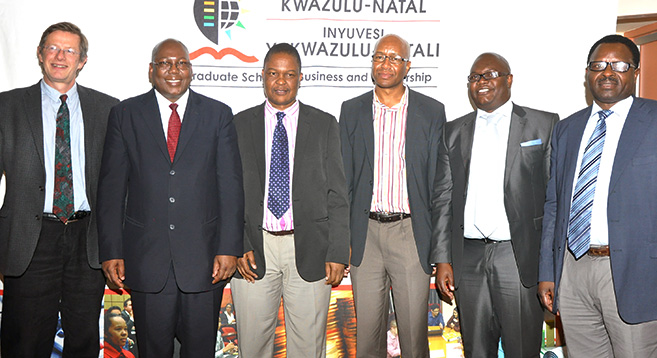 From left: Professor Patrick Bond, Mr Michael Mabuyakhulu, Mr Lesiba Seshoka, Mr Jacob Twala, Mr Owen Nkomo and Professor Stephen Migiro.
From left: Professor Patrick Bond, Mr Michael Mabuyakhulu, Mr Lesiba Seshoka, Mr Jacob Twala, Mr Owen Nkomo and Professor Stephen Migiro.The future of South Africa’s Economy Explored at Business Forum
The South African Economy – 20 Years and Beyond, was the theme of UKZN’s Graduate School of Business and Leadership’s recent Business Forum.
Panellists MEC: Economic Development and Tourism in KwaZulu-Natal, Mr Michael Mabuyakhulu; Director: Centre for Civil Society at UKZN, Professor Patrick Bond; Executive Partner: Inkunzi Investment, Mr Owen Nkomo, and Economic Specialist: KwaZulu-Natal Provincial Treasury, Mr Jacob Twala debated the performance of the South African economy in the two decades of democracy and its future in the face of challenges such as the protracted strike in the platinum sector.
The informative debate, chaired by UKZN’s Executive Director of Corporate Relations, Mr Lesiba Seshoka, created a platform to scrutinise and unpack the issues surrounding the current state of the South African economy, government strategies for economic growth and stability, foreign investment, the building of inclusive economies and the need for radical economic transformation.
During his speech, Mabuyakhulu explained the government’s strategies and plans for economic development in line with the National Development Plan, and that of an inclusive economy that stimulates growth.
Mabuyakhulu also highlighted that the analysis of the country’s economy should be realistic and pragmatic as the country was moving into a knowledge-based economy that promoted partnerships, an open society and a stable and cost efficient market for investors.
Nkomo delivered a presentation titled: “SA Economy, 20 Years Gone, How do we Prepare for Tomorrow” - which touched on business and social issues and how the country should be moving forward.
‘We should adopt aggressive steps when it comes to monitoring how we implement our plans. We need to enable more entrepreneurs to be creative and allow easy access to funding and look at how we as Africans can grow our economy by putting our country first,’ said Nkomo.
Twala spoke on the structure of the KwaZulu-Natal economy while Bond delivered a presentation on foreign forces destabilising the economy. Bond said the government was not spending enough on the poor and highlighted the economic policies needed to grow the economy.
‘The current grants given to the poor are smaller than ones given out during apartheid times, the houses we are giving are smaller and further away from places of work and public transportation, the toilets don’t even flush. It doesn’t have to be this way.’
These presentations sparked a robust debate among the panel and the audience which included members of the media, postgraduate students and business practitioners who all had different views on the issues raised and utilised the opportunity to debate and voice their opinions.
The engagement not only highlighted the need for more events of this nature but it also identified areas of research that students can explore. Further, it opened a channel for the audience to identify ways they can also contribute in the economic strategies and plans for the future development of the South African economy.
- Thandiwe Jumo



